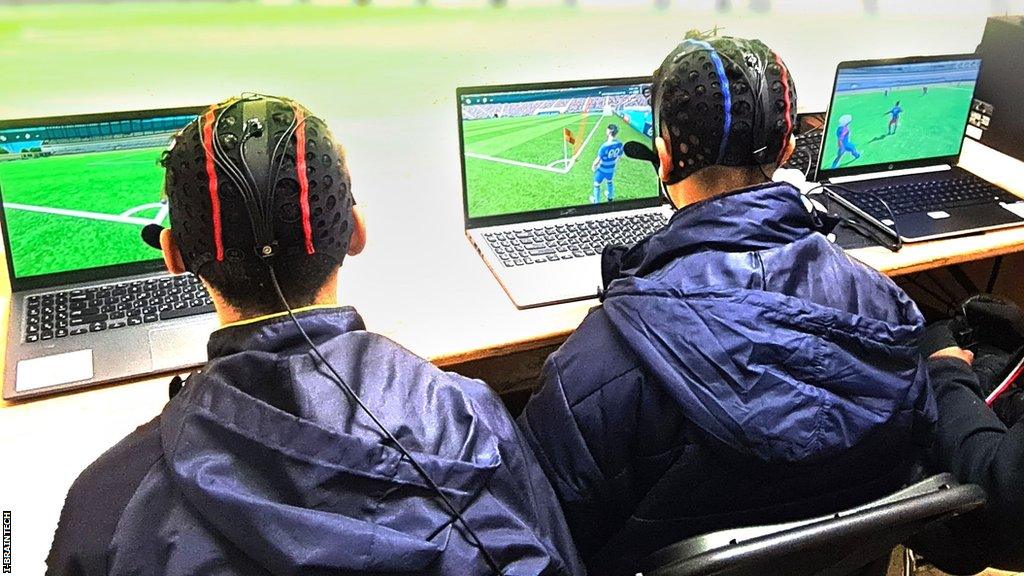The 'brain gym' helping elite footballers improve their focus
- Published

Players in the Royale Union Saint-Gilloise academy work on their focus and concentration
"It is a brain gym," explains Konstantin Sonkin, whose work initially helping stroke victims and patients with cerebral palsy is now benefitting elite footballers.
Neuroscientist Sonkin is the founder of i-BrainTech, which provides clubs and athletes with a method of improving their concentration and accuracy without the risk of physical injury.
The technology has been used by clubs in the Premier League, across Europe and in Major League Soccer as well as in basketball, with plans to enter the golfing world.
"We have five sensory inputs and only one output, everything we do in life we do through motion. Even speech is movement," says Sonkin.
"We have just one channel to express ourselves, this is why it is so important to understand the mechanisms behind that motor control and especially for individuals who lost the ability to move due to brain injuries."
Sonkin and his team developed a programme where players, wearing a special cap, can control an avatar on a screen using just their brain - they can make the character pass or take penalties, corners or free-kicks, but the success of the outcome depends on how well the player is concentrating on the movement.
"It is so unbelievably beautiful that our brain responds to load the same way as muscle does," adds Sonkin. "A person can build sensors in the brain, more and more neurons and connections, the same way muscle does."
Among those to have taken part in trials are players from Maccabi Tel Aviv, Atlanta United, Royale Union Saint-Gilloise, Zenit Saint Petersburg and the Portuguese Football Federation, while other clubs have added brain training to their regular schedules.
"That initial 'wow' factor when they start controlling the avatar with their mind only… they see how their level of focus controls ball speed in a game environment, how sensitive it is," says Sonkin, who is based in Israel.
"We are not set-piece trainers, we are a brain development platform. One of the outcomes could be to improve your set pieces, but you work on the sensors of your brain responsible for motor control and concentration and improve this mental ability."
'No magic box to make you Messi'
It is not a completely new phenomenon - seven-time Super Bowl-winning quarterback Tom Brady has talked about how he uses a brain training app, while Germany's Footbonaut worked more on improving a player's reaction times and Jurgen Klopp credited the work of German company Neuro11 in maximising his Liverpool squad's mental performance during penalty shootouts.
Former USA international Jonathan Bornstein was looking for a way to maximise his training when he learned about i-Brain's technology. He introduced it to medical staff at Chicago Fire, emphasising the importance of being able to train without putting extra strain on his body.
"It's this unbelievable link where you're playing this video game with your brain and you're reinforcing these neural pathways that are the same ones you'll use on the field," explains Dr Brian Forsythe, Fire's head orthopaedic surgeon, who also works with basketball team Chicago Bulls and baseball's Chicago White Sox.
"I've had players use the technology after injuries that have resulted in long-term lay-offs, a professional basketball player used it to maintain his focus and stay engaged with the sport.
"After an ACL reconstruction, when they can't play for nine months or so, not only is it something that leads to atrophy of main neural pathways but general disappointment that they're not able to do what they love doing. It maintains pathways but also allows players to feel like they are maintaining their skillset.
"You have to reboot the computer - someone who is used to rapid, complex movements in the heat of competition needs to formulate complex movements very quickly."
At Belgian top-flight outfit Royale Union Saint-Gilloise, academy coach David Caerts has been using the technology with his players - one youngster compared it to playing Fifa with his brain and, while some were sceptical beforehand, the players have experienced positive results.
"I'm very open-minded to new technology. As a coach, you never stop learning and that's very important," says Caerts, who led a control group of 24 players through two 20-minute sessions per week for three months.
"I played many years ago and if you compare football 15-20 years ago it is not the same as today - the players are quicker, the ball moves quicker and it is important that all the body is training.
"You have a physical coach - so many coaches on the field to do a lot of stuff - but they forgot the brain. It is the best solution for the moment to also train the brain to be more clever on the field, to make decisions in quick time."
Sonkin says there is no "magic box that makes you smarter like Lionel Messi", though he hopes to reach a stage where technology can be utilised more widely be athletes of all abilities to improve their performance.
"We are doing very simple stuff," he adds. "We all know that visualisation works and is helpful, we all know that focus and concentration is important. We just created a bridge."